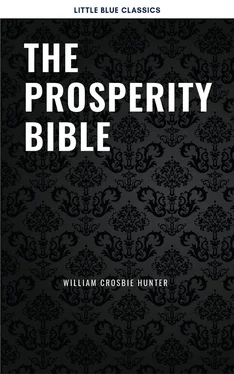Notice that word "primarily," for simple thought, and even mature reasoning, often follows a suggestion accepted in the mind, and the thinker fondly supposes that his conclusion is from first to last based on cold logic.
The Basis of Suggestion
We must think of suggestion both as an effect and as a cause. Considered as an effect, or objectively, there must be something in the hearer that predisposes him to receive suggestion; considered as a cause, or subjectively, there must be some methods by which the speaker can move upon that particularly susceptible attitude of the hearer. How to do this honestly and fairly is our problem—to do it dishonestly and trickily, to use suggestion to bring about conviction and action without a basis of right and truth and in a bad cause, is to assume the terrible responsibility that must fall on the champion of error. Jesus scorned not to use suggestion so that he might move men to their benefit, but every vicious trickster has adopted the same means to reach base ends. Therefore honest men will examine well into their motives and into the truth of their cause, before seeking to influence men by suggestion.
Three fundamental conditions make us all susceptive to suggestion:
We naturally respect authority. In every mind this is only a question of degree, ranging from the subject who is easily hypnotized to the stubborn mind that fortifies itself the more strongly with every assault upon its opinion. The latter type is almost immune to suggestion.
One of the singular things about suggestion is that it is rarely a fixed quantity. The mind that is receptive to the authority of a certain person may prove inflexible to another; moods and environments that produce hypnosis readily in one instance may be entirely inoperative in another; and some minds can scarcely ever be thus moved. We do know, however, that the feeling of the subject that authority—influence, power, domination, control, whatever you wish to call it—lies in the person of the suggester, is the basis of all suggestion.
The extreme force of this influence is demonstrated in hypnotism. The hypnotic subject is told that he is in the water; he accepts the statement as true and makes swimming motions. He is told that a band is marching down the street, playing "The Star Spangled Banner;" he declares he hears the music, arises and stands with head bared.
In the same way some speakers are able to achieve a modified hypnotic effect upon their audiences. The hearers will applaud measures and ideas which, after individual reflection, they will repudiate unless such reflection brings the conviction that the first impression is correct.
A second important principle is that our feelings, thoughts and wills tend to follow the line of least resistance . Once open the mind to the sway of one feeling and it requires a greater power of feeling, thought, or will—or even all three—to unseat it. Our feelings influence our judgments and volitions much more than we care to admit. So true is this that it is a superhuman task to get an audience to reason fairly on a subject on which it feels deeply, and when this result is accomplished the success becomes noteworthy, as in the case of Henry Ward Beecher's Liverpool speech. Emotional ideas once accepted are soon cherished, and finally become our very inmost selves. Attitudes based on feelings alone are prejudices.
What is true of our feelings, in this respect, applies to our ideas: All thoughts that enter the mind tend to be accepted as truth unless a stronger and contradictory thought arises.
The speaker skilled in moving men to action manages to dominate the minds of his audience with his thoughts by subtly prohibiting the entertaining of ideas hostile to his own. Most of us are captured by the latest strong attack, and if we can be induced to act while under the stress of that last insistent thought, we lose sight of counter influences. The fact is that almost all our decisions—if they involve thought at all—are of this sort: At the moment of decision the course of action then under contemplation usurps the attention, and conflicting ideas are dropped out of consideration.
The head of a large publishing house remarked only recently that ninety per cent of the people who bought books by subscription never read them. They buy because the salesman presents his wares so skillfully that every consideration but the attractiveness of the book drops out of the mind, and that thought prompts action. Every idea that enters the mind will result in action unless a contradictory thought arises to prohibit it. Think of singing the musical scale and it will result in your singing it unless the counter-thought of its futility or absurdity inhibits your action. If you bandage and "doctor" a horse's foot, he will go lame. You cannot think of swallowing, without the muscles used in that process being affected. You cannot think of saying "hello," without a slight movement of the muscles of speech. To warn children that they should not put beans up their noses is the surest method of getting them to do it. Every thought called up in the mind of your audience will work either for or against you. Thoughts are not dead matter; they radiate dynamic energy—the thoughts all tend to pass into action. "Thought is another name for fate." Dominate your hearers' thoughts, allay all contradictory ideas, and you will sway them as you wish.
Volitions as well as feelings and thoughts tend to follow the line of least resistance. That is what makes habit. Suggest to a man that it is impossible to change his mind and in most cases it becomes more difficult to do so—the exception is the man who naturally jumps to the contrary. Counter suggestion is the only way to reach him. Suggest subtly and persistently that the opinions of those in the audience who are opposed to your views are changing, and it requires an effort of the will—in fact, a summoning of the forces of feeling, thought and will—to stem the tide of change that has subconsciously set in.
But, not only are we moved by authority, and tend toward channels of least resistance: We are all influenced by our environments . It is difficult to rise above the sway of a crowd—its enthusiasms and its fears are contagious because they are suggestive. What so many feel, we say to ourselves, must have some basis in truth. Ten times ten makes more than one hundred. Set ten men to speaking to ten audiences of ten men each, and compare the aggregate power of those ten speakers with that of one man addressing one hundred men. The ten speakers may be more logically convincing than the single orator, but the chances are strongly in favor of the one man's reaching a greater total effect, for the hundred men will radiate conviction and resolution as ten small groups could not. We all know the truism about the enthusiasm of numbers. (See the chapter on "Influencing the Crowd.")
Environment controls us unless the contrary is strongly suggested. A gloomy day, in a drab room, sparsely tenanted by listeners, invites platform disaster. Everyone feels it in the air. But let the speaker walk squarely up to the issue and suggest by all his feeling, manner and words that this is going to be a great gathering in every vital sense, and see how the suggestive power of environment recedes before the advance of a more potent suggestion—if such the speaker is able to make it.
Now these three factors—respect for authority, tendency to follow lines of least resistance, and susceptibility to environment—all help to bring the auditor into a state of mind favorable to suggestive influences, but they also react on the speaker, and now we must consider those personally causative, or subjective, forces which enable him to use suggestion effectively.
How the Speaker Can Make Suggestion Effective
Читать дальше












